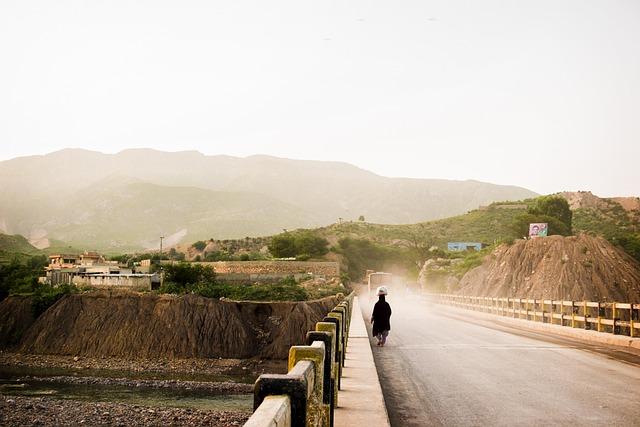Navigating Pakistan’s Challenges: A Path Through Terrorism
In the intricate tapestry of South Asia, Pakistan stands as a nation defined by both resilience and adversity. With a rich cultural heritage and a vibrant populace, it occupies a pivotal geographical position that has shaped not only its identity but also its destiny. Yet, intertwined with its promise are the stark realities of terrorism that have cast long shadows over its development and peace. As the nation grapples with the dual forces of hope and despair, navigating the complexities of this persistent challenge requires a nuanced understanding of its roots, ramifications, and the pathways to healing. This exploration delves into the multifaceted nature of terrorism in Pakistan—charting its historical underpinnings, examining socio-political dynamics, and envisioning a future where resilience triumphs over conflict. In embarking on this journey, we seek to illuminate the struggles and triumphs of a nation poised on the edge of transformation, forging a path toward a more secure and harmonious tomorrow.
Understanding the Roots of Terrorism in Pakistan
To grasp the complexities of terrorism in Pakistan, it is essential to explore its underlying factors. The interplay of socio-political instability, historical grievances, and economic disparity significantly fuels the rise of radical ideologies. These root causes often intertwine, creating a fertile ground for extremist narratives to flourish. Political disenfranchisement, particularly in regions experiencing neglect, tends to breed resentment among the youth, who may turn to violence as a means of expression or resistance. Additionally, ethnic and sectarian divides exacerbate tensions, leading to an environment where extremist groups can capitalize on existing animosities.
Moreover, the impact of foreign interventions, along with the continuous conflict in neighboring Afghanistan, further complicates the situation. Many extremist organizations have used these interactions as propaganda tools, framing their agenda within a broader struggle against perceived foreign aggression. The cyclical nature of violence begetting violence makes it challenging to establish lasting peace. To dismantle this cycle, a multi-faceted approach is vital, one that prioritizes education, community engagement, and economic development, creating pathways out of the shadows of extremism and toward a more stable future.

Strengthening Community Resilience Against Extremism
Communities are the backbone of any nation, and their strength is vital in combating the looming threat of extremism. By fostering open dialogue and promoting civic engagement, we can cultivate a sense of belonging that strengthens social bonds. Initiatives that encourage community gatherings, workshops, and forums allow individuals from diverse backgrounds to share their experiences, promoting understanding and collaboration. Additionally, establishing youth programs that empower young people with critical thinking skills is crucial, as it prevents them from being swayed by extremist ideologies.
Building resilience requires a multifaceted approach that includes educational reform and local governance participation. An increased focus on teaching tolerance, empathy, and conflict resolution in schools can dissolve misconceptions and foster a culture of peace. Moreover, local governments can play a significant role by providing platforms for community voices, ensuring their concerns are heard and addressed. The following table outlines potential community programs aimed at resilience-building:
| Program | Description | Target Group |
|---|---|---|
| Peace Dialogues | Community forums focusing on conflict resolution and cultural exchange. | All ages |
| Youth Empowerment Workshops | Skill-building sessions to enhance critical thinking and local leadership. | Teens and young adults |
| Local Art Initiatives | Collaborative art projects that promote social cohesion and stories of resilience. | Artists and community members |

Policy Reform: Building a Framework for Effective Counterterrorism
To effectively combat terrorism, it is essential to establish a comprehensive policy framework that tackles the root causes of extremist ideologies. This framework should focus on social, economic, and educational reforms that foster a more inclusive society. By addressing grievances and providing opportunities for marginalized communities, we can reduce the allure of violent extremism. Key components of this reform agenda include:
- Community Engagement: Involving local leaders and organizations to build trust and promote dialogue.
- Economic Development: Providing training and job opportunities in underdeveloped regions.
- Education Initiatives: Fostering critical thinking and tolerance through educational curricula.
Furthermore, an effective response to terrorist threats necessitates strengthening law enforcement and judicial systems to ensure accountability and uphold the rule of law. The establishment of a clear framework for inter-agency coordination will enhance intelligence sharing and operational effectiveness. Additionally, measures such as the following can reinforce this framework:
- Enhanced Training: Providing specialized training for security personnel to manage threats effectively.
- Data Privacy Protections: Implementing safeguards to balance civil liberties with security needs.
- International Collaboration: Partnering with global allies to share best practices and resources.

Promoting Education and Economic Opportunities as Long-term Solutions
In the quest to achieve sustainable peace and stability, fostering education emerges as a pivotal long-term strategy. By investing in educational initiatives, we can empower the youth with the knowledge and skills necessary to build a brighter future. Education plays a crucial role in mitigating the allure of extremism, offering an alternative narrative that promotes critical thinking and tolerance. Governments, alongside local and international organizations, should focus on:
- Developing accessible educational infrastructure in rural areas
- Promoting vocational training programs that align with market needs
- Enhancing quality of education through teacher training and curriculum development
- Encouraging community involvement in schooling to foster a sense of ownership
Furthermore, economic opportunities act as a catalyst for change. By creating jobs and fostering entrepreneurship, individuals are offered a stake in their society’s stability and progress. Economic empowerment helps to dismantle the cycle of poverty and violence by ensuring that people have a means to support their families and pursue their dreams. Essential strategies to achieve this include:
- Investing in small and medium enterprises (SMEs) through microfinance
- Promoting technological innovation and access to digital markets
- Facilitating public-private partnerships to stimulate economic growth
- Providing training programs tailored to emerging industries
In Retrospect
navigating Pakistan’s multifaceted challenges, especially the specter of terrorism, requires a collective commitment to resilience, dialogue, and reform. While the shadows of the past loom large, they need not dictate the future. The journey towards peace and stability is fraught with obstacles, yet it is also laden with opportunities for growth and unity.
As the nation stands at a crossroads, the importance of fostering understanding, embracing diversity, and prioritizing human rights becomes paramount. By harnessing the strength of its people and the potential of its institutions, Pakistan can carve out a narrative of hope—a story not just of survival but of revival.
With each step taken towards healing and collaboration, a brighter horizon becomes visible, inviting all stakeholders—citizens, leaders, and international partners—to play their part in weaving together a tapestry of peace. The path may be long, but with determination and shared resolve, Pakistan can indeed turn its formidable challenges into the catalysts for a thriving future.



